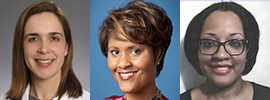|  | |
 |
| Teaching the educators |  | Jennifer Brandt, Taryn Taylor, Delores Lloyd |
As a rheumatologist at Grady Memorial Hospital and the Emory Clinic, Jennifer Brandt spends her days treating patients with rheumatoid arthritis, lupus, osteoarthritis, and other inflammatory diseases. She researches quality initiatives at Grady to increase patient access and improve interdisciplinary care. She also teaches rheumatology fellows and internal medicine residents in the outpatient setting.
It's the latter task for which she feels the least prepared. "Teaching is one of the most challenging but also fun parts of my job," says Brandt. "We didn't get any instruction in how to teach in medical school. As much as I enjoy it, I also wonder how I could be a more effective teacher."
So next month Brandt will join 13 other members of the Woodruff Health Educators Academy (WHEA) Teaching Fellowship to shore up those teaching skills. The group, with faculty from medicine and public health and nurses from Emory Healthcare, will meet monthly for a year to delve into topics such as lesson planning, curriculum development, teaching strategies, and assessment tools.
The new teaching fellowship grew out of WHEA's first offering, a fellowship in educational scholarship. These fellows, who are halfway through their 18-month program, have been studying education research, analyzing best methods and practices, and learning how to disseminate those research findings. When going through the applications for this inaugural fellowship, WHEA co-directors Linda Orkin Lewin and Ulemu Luhanga noticed that some of the applicants were more interested in improving their teaching skills than in doing education research, so they decided to launch a second offering.
"The Woodruff Health Sciences Center, like every academic health center, has a tripartite mission of teaching, scholarship, and service," says Luhanga, an education researcher. "However, the teaching part often does not get the recognition or support that the other two enjoy. That recognition led us to develop WHEA and the fellowships."
The teaching fellows will meet for two-hour sessions once a month to study adult learning theory, the principles of teaching, and more. Between the sessions, fellows will participate in online group discussions of practical applications for the theories they've learned. "They might talk about how to address a challenged or difficult learner, for example," says Taryn Taylor, pediatrician and director of the teaching fellowship. "Or one of the fellows might want feedback on interactive strategies to get the students involved."
For their capstone project, each fellow will create a newsletter submission summarizing his or her project. The submissions will be combined into a volume that will be available on the WHEA website as a resource for other health educators.
The teaching fellowship is unique in that it is open not only to faculty of the schools of medicine, nursing, and public health, but also to clinicians in Emory Healthcare. Delores Lloyd is such a fellow. An RN in Winship's bone marrow transplant clinic, Lloyd does not lecture in any classrooms, but she is responsible for teaching patients about their treatment plans, medications, and recovery process. "I want to learn about different educational techniques so that I might be able to develop a tool to ensure we all educate our patients in the same way and cover all the necessary topics," says Lloyd. "I'm hoping the teaching fellowship will help me improve my practice and nursing processes here."
On completing the teaching fellowship, participants will get a certificate of distinction in teaching. Graduates will also have the opportunity to teach workshops, as core faculty, to future fellowship cohorts. A call for applications for the 2020 teaching fellowship cohort will go out next fall.
The teaching fellowship and the fellowship in education scholarship are two of the key activities of WHEA. Others include an interprofessional education journal club led by Lewin; a lecture series led by Jodie Guest, professor in public health and medicine; and an online program of self-paced, guided evidence-based educator development.
"Everything we are doing at WHEA is about building and supporting an interprofessional community of educators," says Luhanga. "We want to grow the field and support the work we are passionate about."--Martha McKenzie | |
| |
|

